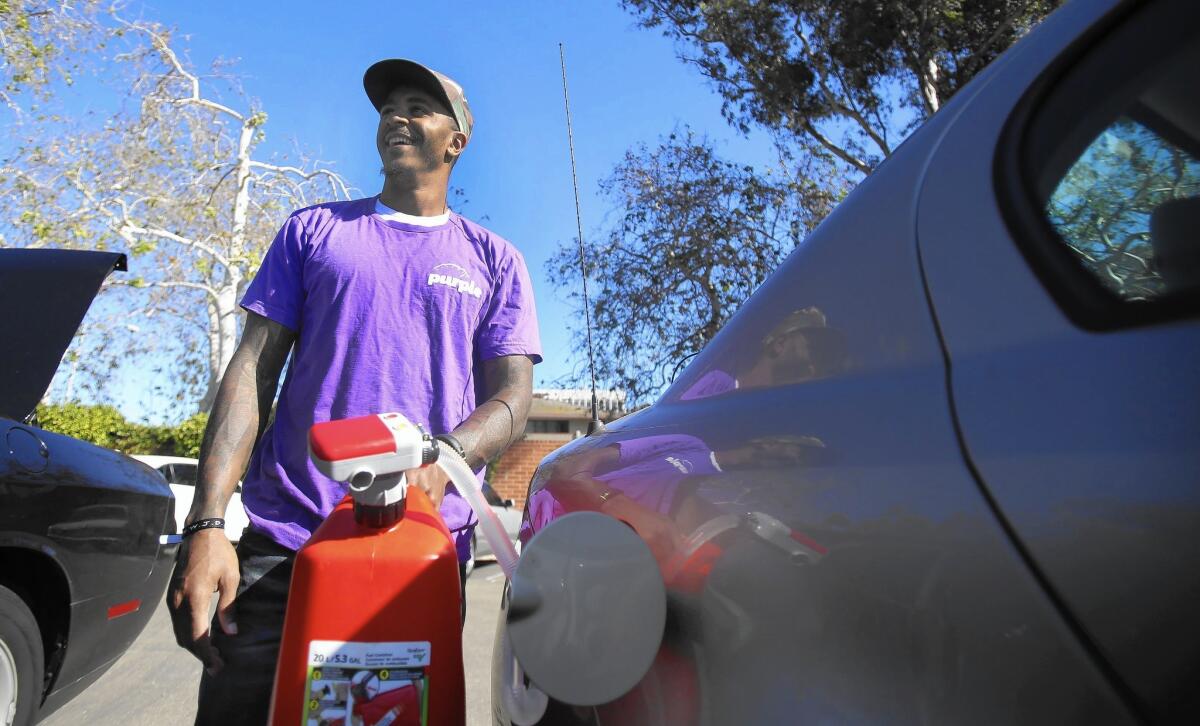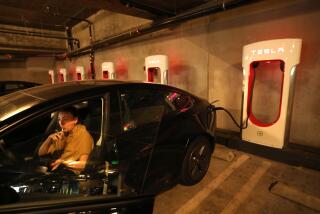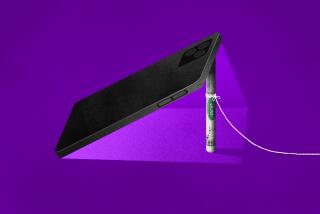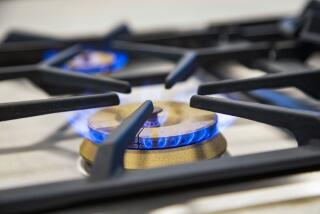Start-up app Purple fills up gas tanks for time-crunched customers

- Share via
Even in an era when no errand is too small to outsource to a smartphone application, start-up Purple, which dispatches a stranger to fill up your gas tank, might smack as on-demand capitalism gone too far.
That’s right. You can now push a button to get gas — no trip to the station required.
With Los Angeles-based Purple, which expanded into San Diego last month, customers can use the company’s iPhone or Android app when they’re short on fuel. A Purple “courier,” clad in a purple T-shirt, will come to your location in one to three hours, find your car and add 10 or 15 gallons of gas (using portable gas cans) to your tank.
Your credit card is billed the going rate for gas, as advertised in the application, with rates comparable to what you might find at stations in your neighborhood. A service charge for the longer, three-hour delivery window is being waived for the time being. Your only task is to make sure your gas tank is accessible to Purple’s people.
“It’s so convenient. I’m always waiting to the last minute to fill the gas tank,” said Stephanie Aviv, 41, a Los Angeles resident and Purple customer who has abandoned the gas station altogether. “In my head, it’s such a waste of time to go to the gas station.”
She is the type of repeat customer Purple had in mind when the company launched its on-demand gas app in Los Angeles in May. Backed by millions of dollars in seed financing (with some coming from Uber co-founder Oscar Salazar), Purple has the lofty ambition of upending the old-fashioned fuel business the same way Uber disrupted the taxi market, using smartphone technology to save consumers time and effort.
With Americans filling up on more than 9 million barrels of gasoline a day, according to the U.S. Energy Information Administration, perhaps there’s a real market for a new kind of full-service fill-up. Purple isn’t the only start-up to think so. At least two other apps, Filld and FuelMe, are delivering fuel on demand in different markets.
Purple says it has signed up “thousands” of users in its first two markets, Los Angeles and San Diego. Purple gets 50% of its daily orders from recurring clients, said co-founder Bruno Uzzan, a sign, he said, that the service is proving useful to its earliest adopters. The start-up plans to expand to parts of Orange County in early December.
“Most of us don’t like to go to the gas station,” Uzzan said. “Our customers are saying they are losing time. It takes 10 to 15 minutes to fuel a car, and they wish they could spend the time on something else.”
SIGN UP for the free California Inc. business newsletter >>
To sweeten the deal of getting gas on demand, Purple charges only a $1 convenience fee for one-hour delivery in Los Angeles. For now, customers who opt for three-hour service can get fill-ups without the added surcharge. Rates will increase eventually, but the idea is to hook consumers with a bargain that’s too good to pass up.
The company charges a small markup over what it pays for the gas, which couriers simply cart away from the cheapest stations in town, but the difference might be negligible to those not pinching their pennies.
“The price is almost the same as the gas station,” Aviv said. “It seems like a luxurious thing to do, but it’s not.”
But gas is a sticky subject for many consumers, some of whom have no qualms rerouting their commutes to stop at the most affordable stations in town. Plus, although Purple may not be an upscale-only offering, the First World problem the app solves certainly invites at least a modicum of ridicule.
“Whereas mobile apps can really make our lives easier, I question how lazy we’re getting when we need to call someone to fill up our gas tank,” said Steven Osinski, a professor of marketing and the chairman of the Lavin Entrepreneurship Center at San Diego State University.
With the proliferation of smartphones, the on-demand boom isn’t anticipated to bust, but some of the companies certainly will. As Osinski put it, some specializations are so niche they can’t be sustained.
But Lania Bettin, for one, said she’d use Purple again.
“I live across the street from a gas station,” the Los Angeles resident said, “but I don’t always have time to make the stop.”
Twitter: @jbruin
ALSO
Pfizer and Allergan’s $160-billion pharmaceutical merger puts new twist on tax-avoiding inversions
TrueCar names former AutoTrader.com boss its new chief executive
Korean American lender Hanmi proposes $1.6-billion merger with rival BBCN
More to Read
Inside the business of entertainment
The Wide Shot brings you news, analysis and insights on everything from streaming wars to production — and what it all means for the future.
You may occasionally receive promotional content from the Los Angeles Times.










